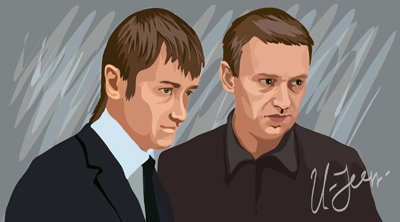MOSCOW, October 17 (RAPSI) – The European Court of Human Rights (ECHR) found no political motives in prosecution and conviction of Russian opposition politician Alexey Navalny and his brother Oleg in the Yves Rocher embezzlement case, Russia’s Justice Ministry commented on the Strasbourg court’s ruling issued on Tuesday.
The European Court of Human Rights confirmed that delivery of justice in the criminal case could not pursue political agenda. Inadmissibility of this aspect of the complaint was so obvious for the ECHR that the applicants’ arguments about alleged political motives of their prosecution were not even included in the subject for study, the Ministry said.
The Strasbourg court on Tuesday held that there was violation of Article 6 (Right to a fair trial) and Article 7 (No punishment without law) of the European Convention on Human Rights (Convention). However, the ECHR refused to recognize criminal prosecution of the Navalny brothers as politically motivated by declaring their complaints “under Article 18 in conjunction with Articles 6 and 7 of the Convention inadmissible”.
The Court ordered Russia to pay €55,000 to Alexey Navalny in compensation. Oleg Navalny was awarded about €21,000 and 460,000 rubles.
The awarded compensations are significantly less than the requested ones, the Justice Ministry noted. Moreover, the ECHR dismissed the applicants’ claim for the compensation of their payments in a civil lawsuit, the statement reads.
In December 2014, Navalny was given a 3.5-year suspended sentence in the Yves Rocher case. His brother Oleg received a 3.5-year prison term. They were convicted of stealing nearly 30 million rubles (about $500,000 at the current exchange rate) from two companies, including Russian affiliate of Yves Rocher. The term of Oleg Navalny is to expire on June 30, 2018.
They filed the application with the ECHR in January 2015. The applicants complained that they had been convicted “based on an unforeseeable application of criminal law, in breach of Article 7 of the Convention, and that those proceedings had been conducted in violation of Article 6 of the Convention.” The brothers also insisted that their prosecution and conviction had pursued “purposes other than bringing them to justice, in particular curtailing public and political activity of Alexey Navalny.
In March 2016, the complaint was communicated to the Russian government.



